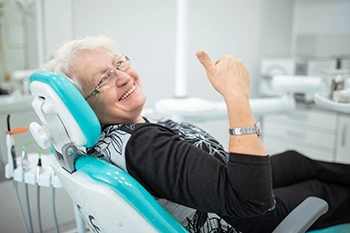When you are missing one or more teeth, eating can be a challenge. This is one of the reasons that replacement is so important. While you can replace missing teeth with a dental bridge or dentures, dental implants offer the most natural look, feel, and function
According to the American Dental Association, dental implants are a top-tier tooth replacement solution Calm Dental offers a variety of dental implant options from single-dental implants to hybrid options. Dental implants restore your ability to bite/chew a variety of foods
 While dental implants do improve your dietary choices, there are a few things you must keep in mind. There are certain foods that you should eat following surgery that improve your recovery process and others that you should avoid because they can cause complications.
While dental implants do improve your dietary choices, there are a few things you must keep in mind. There are certain foods that you should eat following surgery that improve your recovery process and others that you should avoid because they can cause complications.
Foods that Promote Recovery
There are several foods that you should eat following dental implant surgery, and other procedures, including:
- Smoothies: smoothies are made with proteins, fruits and veggies, which provide essential nutrients and are soothing to the surgical site
- Pureed soups: warm, pureed soups made with legumes and/or veggies are full of nutrients
- Scrambled eggs: eggs are packed with protein and are soft and easy to chew
- Applesauce: applesauce is gentle on the surgical site and is packed with fiber, which can help with digestion
- Mashed potatoes: mashed potatoes are soft and nutrient-rich, and can be fortified with cheese or gravy for extra flavor
- Oatmeal: oatmeal is full easy to eat and also high in fiber, which promotes heathy digestion
- Soft pastas: pasta should be cooked until tender and you can add different sauces for flavor
- Fish: fish is soft and easy to chew when steamed, poached, or baked and packed with omega-3 fatty acids
- Ground meat: ground meats are easy to chew and can be flavored and cooked in a variety of ways, including in pasta sauces and meatloaf
- Pudding/custard: these desserts are soft and smooth and can satisfy cravings without damaging the surgical site
- Hummus: hummus is made from pureed chickpeas and can be flavored in a variety of ways- it can be eaten with crackers or soft pita bread for a protein-rich snack
- Bananas: bananas are full of potassium and other nutrients that your body needs for healing
- Steamed/boiled veggies: vegetables are full of vitamins and minerals, and when boiled/steamed can be soft enough to chew
While you should not consume dairy right away, you can choose foods like these after the incision starts to heal.
- Cottage cheese: cottage cheese is a soft food that is packed with calcium and protein, which supports bone health.
- Yogurt: yogurt is full of nutrients including probiotics and calcium and is gentle on your gums
- Ice cream/sorbet: cold treats can soothe the surgical site, and temporarily relieve discomfort
Foods to Avoid
While dental implants do improve your ability to eat, proper care following implant surgery is critical for ensuring successful healing and osseointegration. There are certain foods that can cause damage to the implant site, discomfort/irritation, or infection, as well as delay healing and cause implant failure. Some of the foods that should be avoided include:
- Dairy: dairy has been shown to cause inflammation in soft oral tissues
- Hard candies: can cause the implant to be cracked or dislodged
- Popcorn: small kernels/pieces of kernels, can become trapped around the implant, which can result in pain/infection
- Nuts: many are hard, which puts too much pressure on the implant
- Ice: you should never crunch on ice because it can damage your teeth- even artificial ones. In addition, chewing ice can slow down healing time
- Raw veggies: while they can be good for you, some veggies such as carrots and celery can be hard and put too much pressure on the implant. Tomatoes are acidic and can cause irritation to the implant site
- Apples: while applesauce is good, a whole apple or apple slices are bad because they can put too much pressure on the implant site
- Sticky foods: sticky candies such as taffy and caramel can pull at the implant which can cause discomfort and may even cause the implant to shift
- Crusty bread: hard, crusty bread can be hard on the implant site during the recovery process
- Chips: the sharp edges can irritate/damage the surgical site
- Steak: tough foods are hard to chew and may put too much strain on the site
- Fried foods: as a general rule, fried foods are not ideal for healing
- Alcohol: while it may help relieve some discomfort, alcohol can delay healing and may interact with some of your medications
- Hot beverages: these can cause discomfort, which delays recovery
- Spicy foods: spicy foods can cause irritation and delay healing
- Acidic foods: vinegar-based foods, tomatoes, citrus fruits, and other acidic foods can cause irritation and increase sensitivity
- Fruits with small seeds: fruits such as strawberries and raspberries contain tiny seeds that can get lodges in the implant site, which can cause infection
- Raw sushi: pressure from biting down on rolls and/or raw fish can cause the implant to shift
Dairy products are packed with vitamins and minerals that are critical for your overall health. However, they are also known to trigger inflammation in soft oral tissues, especially around the already irritated surgical site. This can ultimately lead to infection and implant failure.
In addition, dairy can trigger nausea and vomiting, which introduces stomach acids into the mouth that can irritate the surgical site.
While you'll need to discuss your specifics with the dentist, you should be able to add dairy back to your diet after a few days. However, you'll want to stick to soft foods as much as possible for up to 6 months until osteointegration is complete.
If you eat something that is hard, crunchy, tough, or acidic, you risk irritating the implant site, which can ultimately lead to implant failure. If an implant fails, it will need to be removed. In some cases, it can be replaced once the irritation/infection has healed.
 If you are missing one or more teeth, consider scheduling your dental implant consultation with the team at Calm Dental today. We offer a variety of dental implant solutions from single-tooth implants to full-mouth restorations such as All-on-4. This system utilizes 4 dental implants to support an entire arch of missing teeth.
If you are missing one or more teeth, consider scheduling your dental implant consultation with the team at Calm Dental today. We offer a variety of dental implant solutions from single-tooth implants to full-mouth restorations such as All-on-4. This system utilizes 4 dental implants to support an entire arch of missing teeth.
We are located on Olive Street in Los Angeles. We are proud to offer comprehensive dental services for the entire family for patients in and around the Los Angeles area.
We understand that you may be nervous about undergoing dental implant surgery. We are here to help ease those concerns. Therefore, if you have anything that needs to be addressed, we will discuss it. Below are some of the most frequently asked questions that we get about dental implants:
 While dental implants do improve your dietary choices, there are a few things you must keep in mind. There are certain foods that you should eat following surgery that improve your recovery process and others that you should avoid because they can cause complications.
While dental implants do improve your dietary choices, there are a few things you must keep in mind. There are certain foods that you should eat following surgery that improve your recovery process and others that you should avoid because they can cause complications. If you are missing one or more teeth, consider scheduling your dental implant consultation with the team at Calm Dental today. We offer a variety of dental implant solutions from single-tooth implants to full-mouth restorations such as All-on-4. This system utilizes 4 dental implants to support an entire arch of missing teeth.
If you are missing one or more teeth, consider scheduling your dental implant consultation with the team at Calm Dental today. We offer a variety of dental implant solutions from single-tooth implants to full-mouth restorations such as All-on-4. This system utilizes 4 dental implants to support an entire arch of missing teeth.